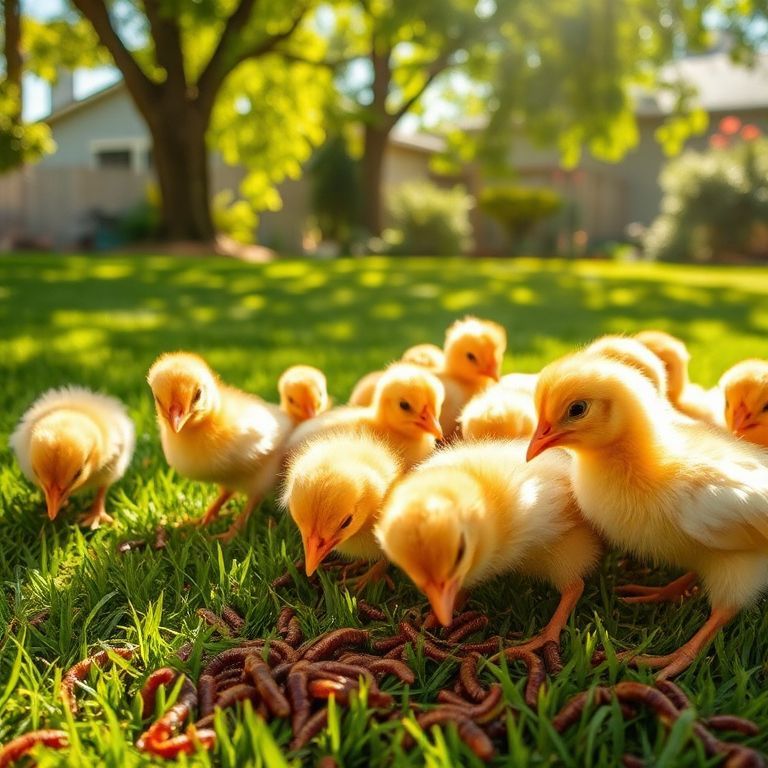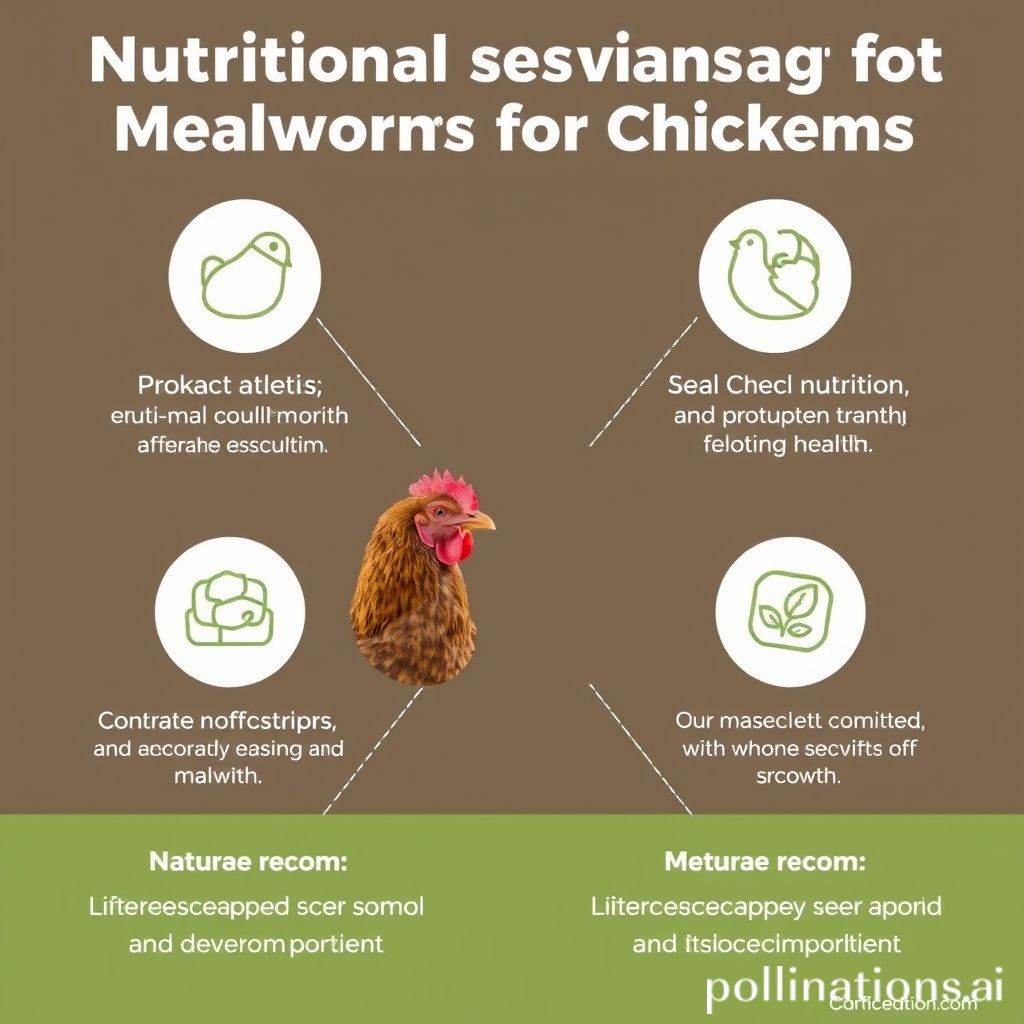There’s nothing quite like the moment your chickens are old enough to enjoy the tasty treat of mealworms. But how old do chickens have to be to eat mealworms? In this informative article, we will explore the appropriate age at which you can introduce mealworms into your chickens’ diet.
Whether you’re a seasoned chicken owner or just starting out, Assimilating the guidelines for feeding mealworms is crucial. We will provide you with the necessary information and expert advice to ensure that your chickens can safely enjoy this nutritious snack. Get ready to satisfy your flock’s cravings and enhance their diet with the delicious addition of mealworms.
Automatic Chicken Coop Door Opener – Solar Powered
Effortless Access for Your Flock
The appropriate age for chickens to consume mealworms
Adding mealworms to a chicken’s diet can be beneficial and nutritious. Notwithstanding, it’s important to determine the right time to introduce these treats. Here are some factors to consider when deciding the age at which chickens can start eating mealworms:
Evaluating the right time to introduce mealworms to a chicken’s diet
1. Growth and development: Chickens go through different stages of growth and development, and their nutritional needs vary accordingly. It’s crucial to wait until the chicks have reached a certain age before introducing mealworms. Generally, it’s recommended to start offering mealworms to chickens when they are around 8 to 10 weeks old. By this age, they should have developed a strong digestive system to handle the treats.
2. Feeding habits: Observing the feeding habits of your chickens can also help determine the appropriate time to introduce mealworms. If the chickens consistently consume their regular feed and show healthy growth, it may be a good indication that they are ready for additional treats like mealworms.
Factors to consider when deciding the age for mealworm consumption
1. Nutritional balance: In the course of mealworms are high in protein and can provide numerous benefits to chickens, it’s important to ensure a balanced diet. Mealworms should be considered as a supplement rather than a staple food. It is essential to provide a well-rounded diet that includes a mix of grains, greens, and other sources of protein.
2. Allergies and sensitivities: Just like humans, chickens can have allergies or sensitivities to certain foods. Before introducing mealworms to their diet, it’s advisable to monitor any potential adverse reactions. Start with small amounts and gradually increase the quantity to prevent any digestive issues or allergic reactions.

Guidelines for Safely Adding Mealworms to a Chicken’s Diet
Mealworms can be a valuable addition to a chicken’s diet, providing important nutrients and a tasty treat. Nevertheless, it’s crucial to follow certain guidelines to ensure a safe and gradual transition. Here are some key things to consider:
1. Gradually Introducing Mealworms to Chickens
When adding mealworms to chickens’ diet, it’s important to do it slowly. Start with small amounts and gradually increase over time. This allows the chickens’ digestive system to adjust to the new food without causing any digestive problems. A gradual transition also helps the chickens develop a preference for mealworms without neglecting other essential feed sources.
2. Monitoring Chickens’ Response to Mealworms
It’s important to closely observe how chickens react to the introduction of mealworms into their diet. Watch their eating habits and overall health to ensure they are tolerating the mealworms well. If any signs of digestive issues or discomfort, such as diarrhea or decreased appetite, appear, reduce or temporarily stop the mealworms until the issues resolve. Always prioritize the well-being of your chickens and adjust their diet accordingly.
3. Balancing Mealworms with Other Feeds
Mealworms should not replace the chickens’ regular feed, but rather complement it. They should be considered as a supplement or treat, not the main source of nutrition. Make sure your chickens have access to a balanced diet that includes a variety of grains, seeds, fruits, vegetables, and high-quality chicken feed. This ensures they receive all the necessary nutrients for optimal health and egg production.
| Benefits of Safely Adding Mealworms to a Chicken’s Diet: |
|---|
|
Advantages of Feeding Mealworms to Chickens at the Appropriate Age
When raising chickens, it is crucial to provide them with a well-balanced and nutritious diet. One food source that can greatly benefit chickens is mealworms. Mealworms offer numerous nutritional advantages and can promote healthy growth and development in chickens. Here are the key benefits of feeding mealworms to chickens at the appropriate age:
1. Nutritional Benefits of Mealworms for Chickens
Mealworms are packed with essential nutrients that contribute to the overall health and well-being of chickens. These tiny creatures are an excellent source of protein, which is crucial for muscle development and egg production in chickens. Protein also plays a vital role in maintaining a strong immune system, enabling chickens to effectively fight off diseases and infections.
In addition to protein, mealworms are rich in beneficial fats and amino acids. These nutrients support feather growth, ensuring chickens have healthy plumage. They also provide energy and aid in the absorption of fat-soluble vitamins.
Mealworms are also a good source of vitamins and minerals, including vitamin B12, vitamin E, and zinc. These nutrients contribute to the overall health and vitality of chickens by promoting proper organ function and helping to prevent deficiencies.
2. Promotion of Healthy Growth and Development
Feeding mealworms to chickens at the appropriate age can significantly impact their growth and development. Young chicks, in particular, can benefit from the high protein content in mealworms, as it supports the development of their muscles and skeletal system.
2.1 Support for Feather Development
Mealworms contain essential nutrients for the growth of feathers in chickens. Feeding mealworms to young chickens can help ensure they develop strong and healthy feathers, which are important for insulation, protection, and flight.
2.2 Enhancement of Immune Function
The protein and other beneficial compounds found in mealworms can boost the immune system of chickens, helping them stay healthy and resistant to diseases. By integrating mealworms into their diet at the appropriate age, chickens can develop a robust immune response, improving their overall health and well-being.

Tips for introducing mealworms to young chickens
Introducing mealworms to young chickens is a good way to give them more nutrition and variety in their diet. In contrast, it’s important to follow some guidelines to keep your chickens safe and healthy. Here are some tips to help you introduce mealworms to young chickens:
1. Start with small amounts of mealworms
When introducing mealworms to young chickens, it’s best to start with small amounts. This allows the chickens to gradually get used to the new food. Begin by offering just a few mealworms and see how your chickens react. If they eat the mealworms without any problems, you can increase the amount over time.
2. Mix mealworms with other feeds to attract chickens
Sometimes, young chickens may be hesitant to try new foods. To encourage them to eat mealworms, you can mix the mealworms with their regular feed. This way, the familiar taste and smell of their regular feed will attract them to try the mealworms. Gradually increase the proportion of mealworms in the mixture to help them get used to the texture and taste.
How old do chickens need to be to eat mealworms?
The recommended age for chickens to start eating mealworms can vary. Generally, most experts suggest waiting until chickens are at least 8 to 10 weeks old before introducing mealworms into their diet. At this age, the chickens’ digestive systems are more developed, and they can handle the protein-rich mealworms better. In contrast, it’s always a good idea to consult with a veterinarian or poultry expert who can give personalized advice based on the specific breed and health of your chickens.
Common concerns and misconceptions about feeding mealworms to chickens
Feeding mealworms to chickens is a popular practice among poultry owners, but there are some common concerns and misconceptions surrounding this topic. In this section, we will debunk these myths and address any potential worries related to feeding mealworms to chickens.
1. Debunking myths about mealworms being harmful to chickens
There is a misconception that mealworms are harmful to chickens, but this is not true. Mealworms are actually a nutritious and safe treat for chickens. They are rich in protein, which is essential for their growth, feather development, and overall health. Contrary to the belief that mealworms can cause health issues, they can actually provide numerous benefits to chickens.
One common myth is that mealworms can make chickens obese. That being said, when fed in moderation and as part of a balanced diet, mealworms do not cause obesity in chickens. It is important to provide a variety of foods and monitor portion sizes to maintain a healthy weight for chickens.
2. Addressing concerns about potential digestive issues
Some chicken owners worry about digestive issues that may arise from feeding mealworms. That being said, mealworms are easily digested by chickens when introduced properly. It is recommended to start feeding mealworms to chickens when they are at least 8 to 10 weeks old. At this age, their digestive systems are more developed, allowing them to process mealworms without any problems.
Conclusion
Comprehending and adhering to age requirements when feeding mealworms to chickens is crucial. By providing a recap of the importance of age requirements, this article emphasizes the significance of introducing mealworms to chickens at the appropriate time.
It is essential for the safety and well-being of the chickens, ensuring that they receive the necessary nutritional benefits without any potential harm. By complying with safe and appropriate practices, chicken owners can enhance their flock’s diet and overall health. Remember to prioritize the age requirements when considering adding mealworms to your chickens’ diet.
Frequently Asked Questions (FAQ) about Feeding Mealworms to Chickens
FAQ 1: Can baby chicks eat mealworms?
Yes, baby chicks can eat mealworms. Notwithstanding, it is recommended to introduce mealworms to chicks after they are at least two weeks old. At this age, their digestive systems are more developed and better able to handle solid foods like mealworms.FAQ 2: How soon can I start feeding mealworms to my chickens?
You can start feeding mealworms to your chickens as soon as they are about 10 weeks old. At this age, they have typically grown enough to consume mealworms without any issues. It is important to introduce mealworms gradually to their diet to avoid any digestive problems.FAQ 3: Are there any risks associated with feeding mealworms to chickens?
Feeding mealworms to chickens is generally safe and beneficial. Notwithstanding, it is crucial to ensure that the mealworms are from a trusted source and are free from any harmful substances or pesticides. Additionally, moderation is key, as feeding excessive amounts of mealworms can lead to an unbalanced diet.FAQ 4: What are the signs that chickens are ready to eat mealworms?
Chickens are usually ready to eat mealworms when they start showing interest in pecking at insects or other small creatures. They may also display increased activity and excitement when mealworms are offered. Notwithstanding, it is important to monitor their digestion and adjust the quantity accordingly.FAQ 5: Can mealworms be the sole source of nutrition for chickens?
No, mealworms should not be the sole source of nutrition for chickens. In the course of mealworms are a good source of protein, chickens require a balanced diet that includes grains, vegetables, and other essential nutrients. Mealworms can be a healthy and nutritious addition to their diet, but they should not be relied upon as the sole source of nutrition.Read Similar Post:
1. How Often To Worm Chickens?
2. How Many Chickens Do I Need For A Dozen Eggs A Week?

